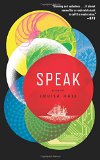Summary | Excerpt | Reviews | Beyond the Book | Readalikes | Genres & Themes | Author Bio

Critics' Opinion:
Readers' Opinion:
First Published:
Jul 2015, 336 pages
Paperback:
May 2016, 352 pages
 Book Reviewed by:
Book Reviewed by:
Rebecca Foster
Buy This Book
That's the general effect of those fish. Experienced inmates avoid them. We gravitate instead to the recreational center, which means the computers are in high demand. Soon, my allotted time will expire. And what will I do to amuse myself then? There are books—yes, books!—but nobody reads them. In the classroom adjacent to the computers, an overly optimistic old woman comes every Tuesday to teach us poetry. Only the nut-jobs attend, to compose sestinas about unicorns and erections. The rest wait for a turn to play Tetris, and I to write my wax-winged memoirs.
Perhaps I'm the nut-job, aggrandizing my existence so much. Perhaps my jury was right. I have always been proud. From the beginning, I was certain my life would have meaning. I didn't anticipate the extent to which my actions would impact the economy, but even as a child I felt that the universe kept close tabs on my actions. Raised by my grandmother, I was given a Catholic education. I had religious tendencies. A parentless child who remembered his absent, drug-addled mother and father only in a mistaken nimbus of memory-dust, I found the concept of a semi-immortal semi-orphan, abandoned by his luminous dad, to be extremely appealing. I held myself to that standard. Early forays into the masturbatory arts convinced me I had disappointed my Father. My mind worked in loops around the pole of my crimes, whether onanistic in nature or consisting of other, subtler sins. In gym class, in the cafeteria, on the recess cement, when everyone else played games and jumped rope and gossiped among one another, I sat by myself, unable to escape my transgressions. Though I have been told I was an outgoing infant, I became an excessively serious kid.
Of course I was too proud. But you could also say the other kids were too humble. They felt their cruelties had no implications. They excluded me with no sense of scale. I at least knew my importance. I worked hard to be kind to my classmates. I worried about my impact on the environment. I started a club to save the whales that attracted exactly no other members. I fretted so much about my earthly interactions that I had very few interactions to speak of.
As such, computers appealed to me from the start. The world of a program was clean. If you were careful, you could build a program that had zero errors, an algorithm that progressed according to plan. If there was an error, the program couldn't progress. Such a system provided great comfort.
One October afternoon, now edged in gold like the leaves that would have been falling outside, a boy called Murray Weeks found me crying in the back of the wood shop, having just been denied a spot at a lunch table on the grounds that I spoke like a robot. Murray was a sensitive, thin-wristed child, who suffered at the hands of a coven of bullies. "You're not a robot," he sighed, in a tone that suggested I might be better off if I were. As consolation for the pain I had suffered, he produced a purple nylon lunch bag and took out an egg salad sandwich, a Baggie of carrot sticks, and a box of Concord grape juice. I learned that he was a chess enthusiast who shared my passion for Turbo Pascal. Relieved of our isolation, we shared his plunder together, sitting on the floor, surrounded by the scent of wood chips and pine sap, discussing the flaws of non-native coding.
After that wood shop summit, our friendship blossomed, progressing with the intensity that marks most friendships developed in vacuums. The moment on Friday afternoons when we met up after school and retreated to Murray's finished basement was the moment we were rescued from the terrible flood. We became jittery with repressed enthusiasms as soon as we ran down the carpeted stairs, giggling outrageously at the least approach toward actual humor. On Friday nights, Mrs. Weeks was kind enough to whip up industrial-sized batches of her famous chili dip. It fueled us through marathon programming sessions. In the morning: stomachaches, crazed trails of tortilla chip crumbs, and algorithmic victory. We sacrificed our weekends at the altar of Alan Turing's Intelligent Machine, and faced school the next week with a shy, awkward god at our backs. We nurtured secret confidence: these idiots, these brutes, who pushed us on the stairs and mocked our manner of speech, knew nothing of the revolution. Computers were coming to save us. Through each harrowing hour at school, I hungered for Murray's prehistoric computer. I wore my thumb drive on a jute necklace, an amulet to ward off the jeers of my classmates. Surrounded by the enemy, I dreamed of more perfect programs.
Excerpted from Speak by Louisa Hall. Copyright 2015 by Louisa Hall. Excerpted by permission of Ecco, an imprint of HarperCollins Publishers.





The House on Biscayne Bay
by Chanel Cleeton
As death stalks a gothic mansion in Miami, the lives of two women intertwine as the past and present collide.

The Flower Sisters
by Michelle Collins Anderson
From the new Fannie Flagg of the Ozarks, a richly-woven story of family, forgiveness, and reinvention.

The Funeral Cryer by Wenyan Lu
Debut novelist Wenyan Lu brings us this witty yet profound story about one woman's midlife reawakening in contemporary rural China.
Your guide toexceptional books
BookBrowse seeks out and recommends the best in contemporary fiction and nonfiction—books that not only engage and entertain but also deepen our understanding of ourselves and the world around us.